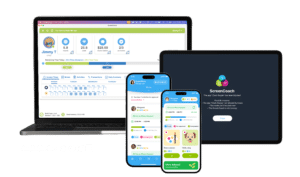
We have all sighed in frustration as our teens have trudged into our homes, eyes glued to their screens. We’ve heard the jokes and seen the memes about teens communicating in grunts, caveman style. But what is it that smart phones are really doing to our teenagers?
Research on screen time in general for young people shows that there are potentially adverse effects, including negative impacts on mental health, behavioural issues, and links to obesity, to name a few (Caroli, Argentieri, Cardone, & Masi, 2004; Laurson, Lee, Gentile, Walsh, & Eisenmann, 2014). Of course, there are also benefits to using screens, when used in line with health recommendations. But there has been an increasing amount of interest in the impacts of smart phone use among teens and its links to their behaviour and overall mental health.
Smart phones could be linked to anxiety and addictive behaviours
A report for The Guardian says that 1 in every 4 children or young people have “problematic smart phone use”, which could be linked to poor mental health. It isn’t so much about the amount of time they spend on screens; it is more about their relationship with their device. The behaviour is considered somewhat addictive, according to Dr Nicola Kalk of King’s College London, who co-authored a study published in the BMC Psychiatry journal.
The fact that over 23% of the 42,000 teens and young adults surveyed across 41 studies feel anxiety when their phones are not on hand, or favouring spending time on their phones at the expense of other activities and responsibilities, is concerning. Studies in America have found (after tracking close to 2,600 teenagers for 2 years) that those who use smart phones heavily are twice as likely to show symptoms of ADHD (Association of American Universities, 2018).
Evidence is not overwhelming
But are smart phones really all that bad? Greater Good Magazine contributor Candice Odgers suggests that these concerns are unfounded. Drawing on experience from a long career as a psychologist, she clarifies that – while 1 in 5 children below 18 years of age suffers from poor mental health (even prior to the age of smart phones) – the current generation are also some of the smartest and most connected young people. ‘There is no good evidence yet that smartphone or social media use is driving these increases. When I looked past the headlines and at the data, I usually found no association between time spent online and mental health for most teens. When there was a link, it was tiny, with an unclear relationship between cause and effect’, she says.
Black Dog Institute (an organisation dedicated to mental health awareness and support) even suggests that there are times when connection via screens (and, in particular, smart phones) is not only beneficial but necessary to support young people in dealing with drastic changes in their routines and environments.
So, what’s the verdict?
In short, there’s not yet enough research to support either opinion. There are obviously arguments for both extremes, with nothing concrete to aid us in our decision making around this issue. As parents, we will need to read up on the potential benefits and negative impacts and make our own decisions. Most likely, it will be a matter of finding our place on the spectrum of potential impacts and going with what works for our own kids and families.
REFERENCES
https://growingupinaustralia.gov.au/research-findings/annual-statistical-report-2015/australian-childrens-screen-time-and-participation-extracurricular
https://www.theguardian.com/society/2019/nov/29/one-in-four-children-have-problematic-smartphone-use
https://greatergood.berkeley.edu/article/item/are_smartphones_bad_for_teen_mental_health
https://www.aau.edu/research-scholarship/featured-research-topics/smartphone-use-linked-behavioral-problems-kids
https://www.blackdoginstitute.org.au/news/screen-time-can-help-with-behavioural-changes-in-kids-during-isolation/Sign up for ScreenCoach for $1 | Pricing Plans | Features Overview






